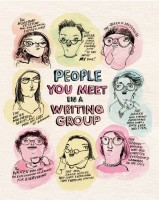
A deliciously cautionary tale about writing groups
ocregister.com – Tuesday June 16, 2020

Ask any writer how it’s going during quarantine, and they will respond, “Not much different than my regular life.” That’s how creativity works for writers. You hole yourself up in your house, plant your butt in your chair, stare at the computer screen, get up, pace the floors aimlessly trying to figure out the next scene, check the fridge for snacks, walk the dog 18 times a day waiting for ideas to come.
Or, if the writing is going well, you sit at your desk clattering away at the keyboard, telling your dog, “In a minute Mommy can take you for a walk. In a minute. Be a good dog.” When the writing is going well, a blessed day is when no delivery person rings the doorbell, no meetings have to be showered and dressed for, and no friend is suggesting you meet for happy hour because they have to tell you about their day. Not all writers love quarantine, but almost all self-quarantine to get the work done.
Writing is work and requires a time commitment and showing up – all the things that any job requires, even meetings. Meetings with agents and editors and psychotherapists. But even before publication, there are writing group meetings.

Want to Strike a Funny Bone?
By G. Miki Hayden
Instructor at Writer's Digest University online and private writing coach
firstwriter.com – Thursday June 4, 2020

My editing client’s (erotic romantic) writing made me genuinely LOL—laugh out loud— which naturally caused me to muse on humor in fiction. The world is going to hell in a handbasket (they lowered workers in handbaskets to set off dynamite while building the railways). But let’s not go all gloomy Gus over our trials and tribulations. Laugh, clown, laugh. Did I mix any metaphors?
Bookselling Requires a Great Query Letter & It's Harder Than It Looks
bleedingcool.com – Monday May 25, 2020
The query letter is a single page—usually closer to half a page—whose purpose is to explain who the writer is and what their book is about. As Hodapp says, the letter has one goal: to get the agent to request the full manuscript, "period." It's harder than it looks. Agents receive thousands of letters and only respond to a small fraction.
Hodapp spent time explaining so many ways a query can go right or wrong. She talked about "comps," or comparative titles, the one or two existing books that the author's book is most like. Sometimes authors are afraid to mention comps because they don't think the comparison is close enough, or they mention too many– just another example of a challenge the author has to navigate to get the agent's eye. She also talked about tone, how authors can let emotions curdle a letter into a sort of complaint email, which defies the purpose of trying to get a follow-up. Hodapp frequently presents on writing and querying, and her advice is invaluable.

How to write a novel in lockdown
goodhousekeeping.com – Saturday May 23, 2020

Summoning up the energy to be both creative and disciplined in order to make something meaningful is an enormous challenge at the best of times. All but the most robotic of writers are in a perpetual struggle to capture the novel that seemed so perfect when it was conceived, so writing well at a time when we are all distracted and anxious and pre-occupied seems even more daunting.
Writing is as much about stamina and discipline as it is about imagination and inspiration, so you need to put yourself in training. Every book is different, with its own unique set of problems, and it’s never easy (and nor should it be, like anything worthwhile) but after 21 novels, I’ve found a few tricks to keep me on track: a combination of routine, confidence-building and kindness.
Literary magazines are often the first place new authors are published. We can’t lose them
theconversation.com – Saturday May 16, 2020
Australia’s literary journals are produced in a fragile ecosystem propped up by a patchwork of volunteer labour, generous patrons and, with any luck, a small slice of government funding.
The Sydney Review of Books, the Australian Book Review and Overland were among a group of publications who sought four-year funding from the Australia Council in 2020 but were unsuccessful.
These publications join the ranks of many others – among them Meanjin and Island – defunded by state or federal arts funding bodies in recent years.

So, you want a critique?
By G. Miki Hayden
Instructor at Writer's Digest University online and private writing coach
firstwriter.com – Saturday May 2, 2020

You asked for it. You may even have paid for it. But you still cringe when you open the emailed result of the critique and begin to read. You wanted to hear that your novel is great and you’re an astonishing writer, yet that’s not what the words on the screen are saying to you... But here are some ideas to let percolate in your mind when you’ve received what you wanted—some honest criticism.

Please Don’t Criticize Me For Writing Pandemic Stories
medium.com – Sunday April 19, 2020

Like many of you, I’ve been writing a lot of COVID-19 related stories over the past several weeks. It’s really hard to think about anything else right now, so given that we generally write about what’s on our minds, it’s not unusual that this is the topic of a good percentage of the stories being written these days.
At the same time, I’ve seen a number of complaints by writers who feel that there is far too much emphasis on this topic, especially on Medium. A common criticism is that there isn’t a balance in terms of topic variety. I do agree that stories that are just rehashed or spun content reporting the same facts that are everywhere you look are a bit annoying. I think we can leave news stories to those who actually report the news.

Sentimentality in Poetry: Emotional Imbalance and How to Avoid it
By Maria Foster
Poet and Writer
firstwriter.com – Saturday April 18, 2020

Nothing is going to turn readers off your writing quicker than that sickly, disingenuous whiff of sentimentality that emanates from aggressively emotional wording. That cliched, pandering thing that so many writers fall into the trap of.
All of my mean adjectives aside, it’s usually not something that happens deliberately. It’s not like people are just padding out their writing with sentimentality, knowing that it sounds awful but doing it anyway just because they want to.
What’s going on is probably more of a misguided attempt at something that is actually sincere. When we’re writing something creative and artistic, it’s almost always going to be an expression of emotion.

Literary Magazines Published by Libraries
bookriot.com – Tuesday April 14, 2020

As both an author and library employee, I’m intrigued by libraries that publish literary magazines. Since so many libraries offer services for local writers and writer organizations, it seems like a natural extension.
In fact, last month I had the pleasure of being a judge—along with authors Sarah McGuire and Peter Raymundo—for the Osceola Library System’s third annual literary contest for kids aged 8–17. The theme was “There’s a Monster in My Lit Mag!” and while the ceremony for the winners has been cancelled, the winners will be read in an upcoming episode of the library’s Nonfiction Friends podcast by Jonathan, the amazing Youth Specialist who coordinated the contest.

Is Your Covid-19 Novel Going to Be THE One?
By G. Miki Hayden
Instructor at Writer's Digest University online and private writing coach
firstwriter.com – Sunday March 29, 2020

“I have no idea what's awaiting me, or what will happen when this all ends. For the moment I know this: there are sick people and they need curing.”― Albert Camus, The Plague
One of the best-known and most well-respected written works in the world is Camus’ novel The Plague. Although the story reads as if Camus personally went through a pestilence, he actually had “only” researched the many plagues that had come before to write his book.
Get the free newsletter | Submit a news item or article | Get Writers' News for your website





